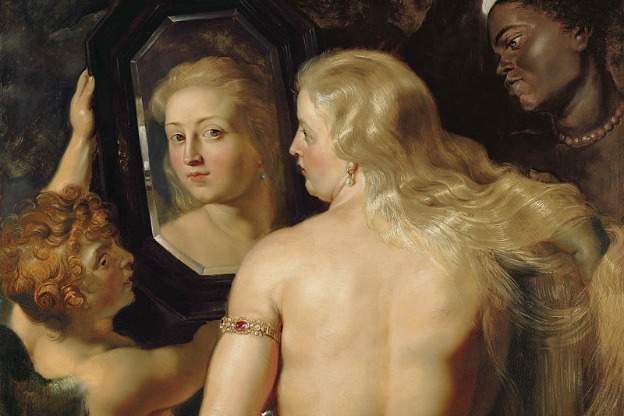
"Mirror, mirror on the wall, who is the fairest of them all?"
Ah, the quest for youth and beauty; it's not just confined to fairy tales. Plastic surgery, skin creams, anti-aging serums-they only go so far. A glance in the mirror, and oh, dear, time marches on! We humans have been catching our reflections and wishing to stall the passage of time for as long we've been aware of our own mortality.
Pleasure, Beauty, Time, or Counsel?
The theme is one to which the aging Handel, with failing eyesight, returned at the end of his life with his allegorical oratorio, The Triumph of Time and Truth. In the story, the characters Time and Counsel (or Truth) confront Pleasure and Deceit in a contest for the soul of Beauty.
When the oratorio opens, Beauty is staring into her mirror, and like the rest of us, she may have breathed a deep sigh. Oh that Time would slow down! But then Pleasure comes along and promises Beauty that her allures will never fade. Encouraged by this, Beauty then gives Pleasure her loyalty.
Counsel counters with the advice that Beauty instead should follow Truth, warning that youth can't last forever. A debate ensues, and all advocate their various merits.
Who will win? Pleasure, buoyed by another character-Deceit, or Time, or Counsel (who represent Truth)?
Given the title of this work, The Triumph of Time and Truth, it's no spoiler to say that by the third act, Beauty, though spending most of Act II torn in indecision, finally resists Deceit and looks squarely into Truth's mirror.
The moral of the story might be universal, but the plot itself isn't anything to write home about. It's really fortunate then that the music is good: classic "Handelian" catchy tunes along with moments of intense feeling.
May I borrow that...?
"Hey," you might be thinking, "that sounds familiar. Where have I heard that before?"
At one point in Time and Truth, Handel lifts music from the "Wretched Lovers" aria and chorus from his popular Acis and Galatea.
And there are lots of other occasions where you'll hear familiar tunes recycled in this oratorio. See, Time and Truth is both one of Handel's last works, and ironically, also one of his first. Most everything is re-used material-a re-incarnation on one of Handel's very early works written at the age of 22.
Handel's original version of the work Il Trionfo del Tempo e del Disinganno (The Triumph of Time and Disillusion) was composed during Handel's travels and studies in Italy in 1707. Through the years, Handel kept coming back to this piece.
Thirty years later when he was living in London, Handel made another version of the piece, still in Italian, (Il Trionfo del Tempo e della Verita). The work previously had no choruses, but in the 1737 version Handel added them per the English taste.
Another 20 years later, Handel revisited the piece when he had the work translated entirely to English. To this 1757 version, Handel again added a number of choruses and several new arias, many to expand the character role of Deceit. It's good to bear in mind that these "new" additions were all taken from other sources, as the task of writing a new composition was for Handel-aging and in poor health with eyesight failing- a difficult challenge.
The added chorus movements include a final halleluja chorus (not the Halleluja Chorus you're probably humming in your head!) and an oddly placed chorus with both words and music directly transplanted from an anthem originally written for a performance at the Foundling Hospital, an organization Handel regularly supported in London. In Time and Truth, the borrowed Foundling Hospital chorus is heard in the midst of Beauty's struggle to renounce Vanity and turn toward Virtue. Interrupting Beauty's dilemma, the choral text seems a little out of place with the words:
"Comfort them O Lord, when they are sick
 Make thou their bed in sickness;
 Keep them alive, Let them be blessed upon the earth,
 and not deliver them unto the foe."
The liner note gives an interesting theory. In 1757, the same year as the revision of Time and Truth, Handel amended his will to include the Foundling Hospital as one of his beneficiaries. The direct use-words and music-of the Foundling anthem in the 1757 Time and Truth oratorio compilation might have been Handel making a statement-possibly a show of "public…devotion to the abandoned which would be in time revealed in his private will."
The revised Triumph of Time and Truth was performed three times in 1757. There were even a few more tweaks before its final performances in 1758 and before Handel died the following year.
Delphian's 2014 Ludus Baroque recording featured today doesn't indicate if the performance is the 1757 or slightly different 1758 version of this piece, or even possibly a hybrid of the two. Whatever the choice, Ludus Baroque's performance is on the whole tasteful and energetic and offered with keen dedication to text, balance and expression.









